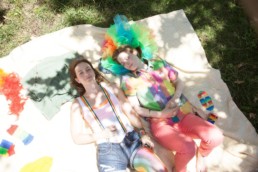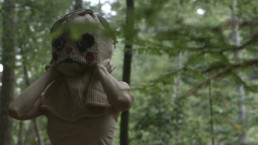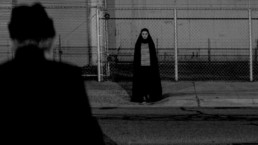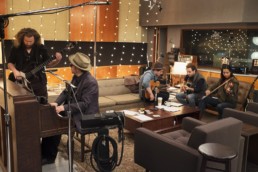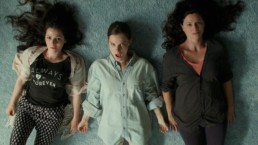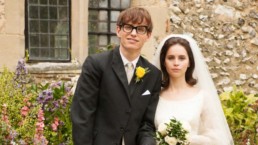Farihah Zaman, Jeff Reichert on 'Remote Area Medical'
It's kind of ironic, I had to take my boyfriend to the hospital Tuesday night, right in the middle of watching this film, and so I watched the second half of the film from a hospital waiting room. It's not that I could relate better to the people in Remote Area Medical after having to wait six hours to be seen by a doctor, but it made me appreciate healthcare in general so much more. Remote Area Medical tells the story of the organization whose mission is to help those who cannot afford to visit the doctor or dentist. Directors Farihah Zaman and Jeff Reichert execute a powerful film that shows both the overwhelming amount of people who need help, all the while keeping their stories intimate. In our exclusive interview, I talk to Farihah and Jeff about their experience making Remote Area Medical. We begin:
CAN YOU DESCRIBE THE ENVIRONMENT AT THE ARENA? IT LOOKS LIKE COACHELLA FROM THE OUTSIDE- PEOPLE ARE CAMPING IN TENTS AND CARS.
FARIHAH ZAMAN: It is utterly overwhelming, particularly because of the venue. You're in a NASCAR speedway which is like a palace to recreational glamour, and here are people camping out, desperate for healthcare. That irony is never lost on you when you're there. Even before we started filming, when we volunteered, there was also some good humor. One of the important things we learned in making the film is that people are not just a summary of their worst problems. That Coachella reference is kind of funny, but kind of true- people were tailgating, flipping burgers, and playing card games. To see that camaraderie tells you a lot about the community in addition to just the need that's there.
DID YOU FIND IT DIFFICULT TO GET PEOPLE TO TALK TO YOU?
JEFF REICHERT: If we as filmmakers try to be really careful about checking out a situation first, not just running up to people. When we saw people we though were interesting, we would put the camera down and walk up to them, like 'Hi I'm Jeff and this is what we're doing.' Once people realized we were there not to just get pictures of poor people waiting in line for care, and that we were interested in them beyond their health problems... we had almost no problems getting people to talk to us and open up. We talked to them about their jobs, their work, what they were like as teenagers, how the met their spouse, etc.
THERE IS ONE MOMENT IN THE FILM THAT'S A LITTLE UNCOMFORTABLE- A GIRL IS TRYING TO GET A NUMBER AND LIES TO A R.A.M. VOLUNTEER. DID YOU ENCOUNTER FEELINGS OF UNCOMFORTABLENESS WHILE SHOOTING?
FZ: I was reminded repeatedly throughout the shooting experience that this is what people have to do to go see the doctor. It's not right. What I found upsetting, but also interesting about that moment in the film you're talking about is that you have compassion for every single person involved. I definitely didn't envy (R.A.M. volunteer) Theresa who has to hand out the last ticket or tell somebody they're not getting in. I feel for that girl because even though she tried to cheat the system, if you were in her position maybe you would do the same thing. I mean, I think I might.
Once people realized we were there not to just get pictures of poor people waiting in line for care, and that we were interested in them beyond their health problems... we had almost no problems getting people to talk to us and open up.
IT'S GREAT THAT YOU BROUGHT REMOTE AREA MEDICAL TO OUR ATTENTION WITH THIS FILM- I PERSONALLY DIDN'T KNOW IT EXISTED. WHEN DID YOU BOTH BECOME AWARE OF R.A.M.?
JR: It was in 2010 when we first heard about the organization through my Aunt, a retired nurse. She saw a special on 60 Minutes and she felt completely compelled to volunteer at a clinic in Tennessee. When she came back home (to New Jersey), she said it was the highlight of her nursing career. She said everybody, medical professional or not, should go and help out. [Farihah and I] went down to a clinic in Kentucky in 2011, and we got the bug there. Seeing all the good that people can do, we though, 'Oh there is a movie in this.'
THE SENSE OF TOGETHERNESS AND COMMUNITY IS SO STRONG IN THIS FILM, WHAT WAS YOUR EXPERIENCE LIKE?
FZ: Because of the small budget, the crew stayed in a vacation rental nearby in Tennessee. We had twenty people in one house! Jeff's cousin came out and would make dinner for the crew every night because we thought that would be more comforting in a way. We put up a lot of organizational systems that mostly worked, shockingly...haha. We also had to be open to the idea that they might break down at times. We had to just roll with the punches because there is so much happening at any given time. In the end, I think we're really glad we made it the way we did, especially because the film ended up being so much about community. One of the things we really loved about R.A.M. is that they don't just come in, pour some money into the community, and then leave; Not only do they provide these services, you really see people band together and that was even more powerful.
JR: Yeah, I think the hardest part was convincing Remote Area Medical that we could do this movie, without jeopardizing their mission. They're very sensitive about being criticized in any way, shape or form. We emailed the general email address [about wanting to make this film] and [founder] Stan Brock emailed us back 20 minutes later like, 'No way, no how, we're not going to let you do this.' The whole next year was spent talking to them and explaining to them what it might look like, who we were, what our background was. It wasn't even until a couple months before we were planning to shoot that we actually got the final OK.
HAVE THE PEOPLE AT REMOTE AREA MEDICAL SEEN THE FILM?
FZ: They have, we've maintained a good relationship with them. Stan has tried to come and do press whenever possible, even though they have a very rigorous schedule. We really appreciate their support, given the fact that we don't hide the flaws of the organization. You have to show that charity is not a viable substitute for a functional healthcare system.
YOUR DECISION TO GO WITH COMPOSER DAVID WINGO WAS AWESOME, I LOVE HIS WORK.
JR: David is actually an old friend, he did the music for my first feature, Gerrymandering, where we settled on this idea of having him do various covers of American patriotic anthems. For this film, he wanted to think about Appalachian music. Where we filmed is the birthplace of country music, and we wanted that reference in the movie as well.
FZ: And actually if you're curious, the models you see in the end credits- there's a Country and Bluegrass Music Museum in the Bristol, TN mall and it's amazing. They have all this incredible history that's just casually put out in this tiny place. There was a scale model of the town of Bristol in this museum, and that's what we ended up filming.
Review: 'Life Partners'
If you're looking for the female equivalent to a bromance film, look no further than Life Partners. Susanna Fogel makes her directorial feature debut with a film about friendship and love- and it's anything but conventional. Actress turned-recent rocker Leighton Meester (Gossip Girl) and Gillian Jacobs, best known as Britta on NBC's Community, bring humor and girl power to Fogel's charming story, making it the perfect movie for a girls night out, or in (if you're into that sort of thing).
Sasha (Meester) and Paige (Jacobs) are best friends. Both nearing 29 years old, they have always had each other to complain about bad dates to and watch America's Next Top Model with- that is, until Paige gets a boyfriend. This seems like typical girly high school drama-fodder, but for Sasha, losing Paige hurts a lot more than she lets on. Sasha is a lesbian and her relationship with Paige is much like sisters (it has always been platonic and nothing more). They know each other's secrets, favorite television shows, and bottle of wine; for Sasha, losing Paige is like losing a part of herself.
Another thing this film has going for it is its soundtrack– lo-fi bands like Tennis and Lowpines ground the film's Southern California vibe and keep the tone of the story chill, yet engaging.
Yes, Sasha is gay, but in the big scheme of the story, that really doesn't matter. This is a story about friendship and the strength of the female bond, regardless of designations like "gay" or "straight." That being said, Meester takes on the more challenging role here, playing Sasha with an upped masculine side, but not too much so that she turns into a caricature. Life Partners could have easily gone in the daytime soap opera direction, and thankfully it doesn't. When Paige introduces her new boyfriend Tim (interestingly enough, Meester's real-life husband Adam Brody) to Sasha, the jealousy stems from losing a friend, not from losing a potential lover. Fogel captures this moment any new boyfriend is introduced to the BFF for the first time with humor and charm.
Another thing this film has going for it is its soundtrack– lo-fi bands like Tennis and Lowpines ground the film's Southern California vibe and keep the tone of the story chill, yet engaging. A quick viewing of the trailer sums up these musical talents sprinkled throughout the film.
As to be expected, this story has a happy ending. The character arcs are universally relatable; for Sasha, it's understanding that while everyone grows up, that doesn't mean they out-grow friends. For Paige, a fight with Tim leads her to realize that her need to always be right will never end well, especially in relationships. It may not be boundary pushing, or revelatory cinema, but Life Partners is easy digestible, inoffensive and just a charming film. The performances are good, the script is solid, and the message is true: best friends are forever.
https://www.youtube.com/watch?v=6CPg7UJIS5I
Review: 'Felt'
Wow, where do I begin? Well, I can start by saying this is not a good first date film, or one you'd want to see with your parents. Despite its etherial visuals and seemingly innocent mumblecore-driven scenes, Felt is an art house-meets-horror film that's equal parts kooky and creepy, and not in the best of ways. An unnerving and unusual film dealing within the genre of rape/revenge culture, Felt is an unobtrusive look into the world of a young adult who makes her way through life by, after experiencing such a tragic event, adapting a male alter-ego, which is her way of coping with a form of PTSD that affects everyone around her. It is an extremely large pill to swallow that will definitely leave you with images you wish you could get out of your brain.
In her sophomore film, artist Amy Everson (www.amyeverson.com) plays Amy Everson, a San Francisco based artist who is struggling with depression. It's unclear what specifically traumatized her, but it becomes blatantly obvious that it was of a sexual nature. I make this assumption because for half of the film, Amy is dressed in a full-length nude leotard with drawn on nipples, a cut up facemask and a faux penis. She converses with her friends in a man's mask, she wanders through the forrest as a "male," and even creates an overly large vagina out of fabric and wears it over her underwear during a nude photo shoot. Yes, it is shocking, but its authenticity is hard to validate- clearly Amy's desperate to escape reality, but it's unclear how much of her actions are honest and how much are for show.
The shock factor is high, every scene adds even more tension, but look past the faux penis and we're left with a story with no emotional attachment to our main character, no conclusion to her actions, and ultimately, no point.
Amy goes from sympathetic to grating as she progressively becomes more disheveled. When she befriends a boy named Kenny (Kentucker Audley), she introduces him to her art pieces, including: a Hitler fetus, ceramic plates of a man spreading his buttocks, a gas mask, and underwear with a faux banana hanging from the crotch, among other oddities. If the goal is female empowerment, then her message gets lost amongst the genitalia hanging from her bedroom. She explains that her art is a reflection of the struggles of being a female, but the excessiveness of sexuality in this film is overwhelming to the degree that it is hard to take anything or anyone seriously. Unfortunately, in its quest to be shocking, Felt comes up short. As a stand alone visual performance piece, however, Felt is spot on.
It's easy to see why this film had a successful run during the festival circuit, its appeal as a true independent film is there. The cast is made up of mostly all amateur actors, a majority of which call Felt their film debut. Jason Banker, the film's director, is also the producer, editor, cinematographer and screenwriter. The script certainly pushes past comfort and convention and into the territory of discomfort, while remaining light and highly improvised. Hearing synth-pop artist Grimes in the soundtrack certainly ups this film's hipster/alternative cred, but at the end of the day, it's mostly just smoke and mirrors. The shock factor is high, every scene adds even more tension, but look past the faux penis and we're left with a story with no emotional attachment to our main character, no conclusion to her actions, and ultimately, no point.
My theory is that Amy Everson is attempting to fill Miranda July's quirky shoes in terms of style- both women were/are performance artists before turning to acting and have used the non-actor approach to filmmaking to create really interesting movies. To her credit, Amy is fearless, fully committed to a character with her same name and occupation. Personally, I would find it more interesting to go behind the scenes of the film and discover the real Amy Everson, leaving the naked bodysuit behind. Until then, we're given this fireball of a film, this psycho-sexual drama that is sure to disturb any sense of normalcy in your day. You can't say I didn't warn you.
https://www.youtube.com/watch?v=rr59LitGL1k
Review: 'A Girl Walks Home Alone At Night'
If you were to hear a film's description as a black and white, Iranian-Western Vampire noir, spoken in Farsi with English subtitles, your natural reaction would probably have been similar to mine: puzzled, humored, and super intrigued. Thanks to the creative and artistic vision from Ana Lily Amirpour- the film's writer, director, and producer- A Girl Walks Home Alone At Night brings a unique voice to the current state of cinema and a wildly entertaining film to the big screen.
A Girl Walks Home Alone At Night, executive produced by Elijah Wood, has that "art school" vibe that can be interpreted as "superficial," but that's far, far from the truth. In fact, it's the first ever Iranian-Western Vampire film ever made (which, actually, may not be all that surprising). Playing out like a spaghetti Western, the desolate ghost town of Bad City lives unaware of a danger lurking on their streets at night. Seemingly innocent by her quiet demeanor and stylish look, the girl, played by the beautiful Sheila Vand, is a lonely and blood-thirsty vampire who preys on the men in her town. It is when she meets a local boy, Arash (Arash Marandi), that she first begins to discover emotions that she has never experienced before, like trust and self-control.
I'm going out on a limb and saying that never before has the use of black and white photography, a film's music, or the use of a cat- yes, cat- been put to better use than in A Girl Walks Home Alone At Night.
The film, much like how I'd imagine Amirpour to be, is organically cool and not in the least bit pretentious. Yes, the vampire girl listens to cool records in her studio apartment/layer, she skateboards down the empty streets and dresses like an American Apparel advertisement, but Amirpour makes her desirable, not distasteful. The hauntingly beautiful imagery plays perfectly against the moody backdrop that is Bad City; the dialogue is sparse but purposeful. This is simplicity in its rawest form- everything from the actors to the cinematography is visually arresting and drool-worthy.
I'm going out on a limb and saying that never before has the use of black and white photography, a film's music, or the use of a cat- yes, cat- been put to better use than in A Girl Walks Home Alone At Night. The black and white is completely for artistic value, the film would not have had the same effect had it been shot in color. In fact, the film's soundtrack has been the topic of conversation in many interviews with Amirpour, praising the unexpected trancelike sounds of the Middle East and the western-inspired Portland based Federale. The music here is really like an additional character, full of life and energy that is the perfect juxtaposition to the black and white landscape. And the cat- the last shot of the film explains everything. How there is not a tiny little person inside of a cat suit blows my mind.
The less you know about this film, the better. I went into it knowing nothing- just the description which, as I mention earlier, intrigued me. If you take away one thing from this review, let is be that this is a film that should be seen by anyone interested in making a film, directors especially. As her feature film debut, Amirpour proves that it's not about how big the budget is or getting big name "celebrities" to star, it truly is about a good script and a clear vision. Although commercial success seems unlikely, that doesn't make A Girl Walks Home Alone At Night any less of a masterful, high-style horror film.
https://www.youtube.com/watch?v=_YGmTdo3vuY
Review: 'Lost Songs: The Basement Tapes Continued'
With its premiere on premium cable channel Showtime this Friday, Lost Songs: The Basement Tapes Continued takes one of the most influential artists of all time, Bob Dylan, and gives new life to his old work, a concept which will no doubt make its mark on the music industry in a legendary way. It has no set theatrical release date yet, and it's doubtful if it will ever get one, but that doesn't make Lost Songs: The Basement Tapes Continued any less of a film worth going out of your way to see.
Lost Songs is a musical love letter to Dylan and his writing, and the brainchild of musician and producer T Bone Burnett. After coming across newly discovered lyrics from Dylan written back in 1967, which were famously called the "Basement Tapes" (written shortly after his motorcycle accident and infamous Woodstock performance), Burnett decided to turn these words into songs. Assembling today's top folk musicians from across the board, they call themselves "The New Basement Tapes." Elvis Costello, Marcus Mumford (Mumford & Sons), Jim James (My Morning Jacket), Rhiannon Giddens (Carolina Chocolate Drops), and Taylor Goldsmith (Dawes) use these lyrics as inspiration for creating original songs in their own signature styles, respectively. Bringing their unique strengths and songwriting abilities to the Capital Records recording studio, the band is given the challenge of making a record in two weeks. Let the chaos and creativity begin.
Johnny Depp even makes a cameo on the electric guitar in the song "Kansas City"- one of the films more memorable songs which you can (and should) watch here.
There is no shortage of inspiring moments in the film. To start, we as the audience are given a private look into the writing and recording process, which is not as glamorous as one may think. Director Sam Jones doesn't hold back in capturing the stress Mumford endures to write the perfect song or the emotional heartbreak Rhiannon feels as the song she was working on falls flat during the recording. The pure talent in the room is mesmerizing; everyone plays multiple instruments on the record, and seeing them effortlessly move from one instrument to the next will leave anyone awestruck. Johnny Depp even makes a cameo on the electric guitar in the song "Kansas City"- one of the films more memorable songs which you can (and should) watch here.
For all of its musical talent, the film isn't just a spectacle of performances; Jones carefully balances the recording process with the true Basement Tapes back story with the aid from a rare and exclusive interview from Bob Dylan. While he isn't shown on camera, he narrates to the archive of pictures Jones supplies of Dylan and his band in the 60's.
The camera is a quiet observer that gives the film the right amount of dramatics in an organic way. Absolutely nothing is forced or contrived; the tear Marcus Mumford sheds after playing is real! That's the overflow of emotions one can expect to feel after watching this film; it touches the soul deeper than you'd think. Lost Songs: The Basement Tapes Continued conquers many things in its seemingly innocent production. Not only does it highlight the great and everlasting influence of Bob Dylan in the music industry, but it also personalizes the modern musicians who participate in making this film, and gives the audience the opportunity to connect with them on a deeper, more emotional level. The last line in the trailer states, "What is a song? A song is limitless," and no truer words have been spoken after watching this intimate and powerful documentary.
https://www.youtube.com/watch?v=-X3hdFWmerQ
Review: 'The Midnight Swim'
A mysterious death tests the relationship between three half-sisters in this eerie, genre-blending feature film debut from director Sarah Adina Smith in The Midnight Swim. Part mystery and part drama, the film tows the thematic line while keeping a cohesive and familiar feeling. Shot from the point of view of one of the sisters (acting as a documentarian), the feel of the film is extremely personal and intimate, a tried, yet welcoming concept that sets this film apart from the rest.
After the drowning of their mother in Spirit Lake, a lake familiar to the girls growing up, as their mother was an activist for its conservation, the three sisters reconnect at their childhood home to bring closure to her untimely death. The personalities range from sister to sister, making it easy to identify with at least one of them; Annie (Jennifer Lafleur) is the oldest and the mature one of the group. Isa (Aleksa Palladino) is the free spirited one whose talks of reincarnation form a central theme within the film. Lastly there's June (Lindsay Burdge), who we don't literally see much because she is the one "documenting" the film as it unfolds. This strong female cast produces engaging performances that translate over the films varying themes.
This strong female cast produces engaging performances that translate over the films varying themes.
While reconnecting with each other after living separate lives for the past few years, the sisters hear about a small-town folklore of the tale of the seven sisters. The legend goes that all seven sisters drowned in Spirit Lake while trying to save each other after a late night swim. Their souls are represented in the sky as stars, but eerily enough, there are only six stars visible to the eye, bringing up questions about that "seventh" sister- like perhaps she still remains at the bottom of the lake. It's haunting, and the girls spend a large amount of time working together trying to figure out if this story is true, and if it could have anything to do with their late mother.
An important thread that runs through the film is Isa's belief in reincarnation. She explains, more than once, that before one is born, your soul has to cross over the river of forgetting, which wipes its memory clean of the life it had just lived. Then, one goes on to the next life and this process keeps happening until all of life's lessons are learned. It's a very meta idea and serves as a cause for contemplation on the part of the audience.
There is one moment in the film that I can only equate to the visual of nails on a chalkboard. In between somber moments of self-reflection at the dock of the lake and subdued quietness, Smith decides it's a good time to incorporate a dance break into the film. Set to the New Seeker's song, "Free To Be You and Me," the girls lip synch and sing into the camera, dancing like girls without a care in the world. While it's a cute scene, it comes at completely the wrong time and will take anybody out of the moment.
The Midnight Swim is a good first attempt from Sarah Adina Smith, after all she chose a fantastic cast and visually, the film is stunning. Unfortunately, the direction seems weak, or even lost at times; a stronger script could have helped guide her toward mastering the simplicity the film desperately needed. However, I definitely wouldn't write off this film, there are a lot of little gems to be appreciated.
http://vimeo.com/98087074
Review: 'Merchants of Doubt'
Director Robert Kenner is no stranger to culturally provocative documentaries, past films include the Oscar-nominated fast food take-down Food, Inc.- and this time he's turning the lens toward big business and their not-so-publicly-known corporate agendas. In Merchants of Doubt, Kenner looks under the veil and into the world of advertising and the spin doctors who manipulate the public perception of various companies. Cigarettes, climate change, and flame retardants are just some of the topics covered in this highly informative and unnerving documentary. Don Draper, avert your eyes.
To drive the point home, Kenner incorporates a magician (who performs in front of a studio audience at The Magic Castle in Los Angeles) into the film- using the analogy of his tricks to better explain the "sneaky" work done by hired hands. The use of the magician, who is actually quite impressive, makes it both easy to understand and fun to follow along.
They say a magician never reveals his tricks, but Kenner does just that once again in Merchants of Doubt...
We quickly discover that this subject is no laughing matter. For years, corporations have hired public relations firms to create and shape trustworthy and honest (honest-enough) company personas for the public interest. How else would they attract customers? The problem is, what was going on behind closed doors was terrifying; by concealing the whole truth about a certain product, it would become misrepresented, usually not in the consumers favor. This is what is described as "honest lying," only revealing facts that paint the company in a positive light. Case in point, archival footage from courtrooms show major cigarette company executives swearing, under oath, that they don't have enough research to conclude that smoking is dangerous, all the while back at the office, hundreds of reports show that smoking kills. If cigarette companies had it their way, there would never be enough research to confirm or deny that fact.
The smoking issue, while important and harrowing, only introduces the film's seemingly larger issue- climate change. This is where Kenner focuses most of his attention, and is where the film gains its strength. Republican Congressman (or as the film shows, soon enough Ex-Congressman) Bob Inglis confidently, and openly, talks about his initial thoughts regarding global warming. The thought that human activity would be even at least partly responsible for planet-warming seemed ridiculous; that is, until he did some independent research and came to the conclusion that humans are very much responsible for this current global warming crisis. Very publicly, Inglis retracts his initial thoughts and becomes an advocate for climate control. His life-altering epiphany is an exception, however, it serves as proof that given unbiased information, tools, and willingness to learn, people are equipped to make educated decisions independently without corporations telling us what they think we want to hear.
They say a magician never reveals his tricks, but Kenner does just that once again in Merchants of Doubt, while also including some of the top scientists and skeptics from the various fields who, although camera-shy (they are renowned scientists and thinkers, after all) are still eager to expose the truth behind various companies claims and their influence on public safety. Once seen, never forgotten, this film does a good job of planting that activism seed in the minds of the audience which, to me, makes it a film worth watching.
https://www.youtube.com/watch?v=j8ii9zGFDtc
Review: 'The Theory of Everything'
I am usually drawn to biopic films on the whole. I admire any actor's attempt to become another, real-life person, and for their willingness to be overly-critiqued for taking on said part. More often than not, we unabashedly pick out the flaws in the performance since, well, since exists a literal person to reference against. And I was getting ready to do just that when I watched the trailer for the new Stephen Hawking biopic, The Theory of Everything. The trailer, as did the film, left me with visible chills down my arms; in fact, this is not just another typical biopic. Powerhouse performances from its lead actors, beautiful camerawork, and palpable emotional intensity make this film so much more.
The Theory of Everything begins when young Stephen, (Eddie Redmayne, delivering a revelatory performance) meets young Jane (Felicity Jones) at a University gathering. Wide-eyed and naive, the two quickly and early on fall in love. It is a case of "opposites attract"-Jane being an artistic and religious girl and Stephen being the nerdy astrophysicist and atheist, the couple soon discover their chemistry and future will know no bounds. But with a sudden (and subtly built) diagnosis of motor neuron disease (ALS, or, Lou Gehrig's disease) at 21 years old, with a diagnosis of having only two years left to live, Jane doubles down on her commitment to him, and the pair are soon married, with children to come, as Hawking continues to work towards his life's educational purpose- discovering an equation to explain the creation of the universe as understood by time's mathematical properties. His motivation to determine the relationship between space and time keeps him distracted from his debilitating disorder, but it's easy to see that it is Jane's love and support that keeps him alive.
Redmayne in this film is like Michael Jordan in the NBA Finals-I was awestruck at the execution and mastery on display. His portrayal of an aging and debilitating Hawking, one of the smartest men in history, is exacted and fully realized. His look, his mannerisms, his body language, and the light in his eyes, with complimentary soft-lit lighting and gorgeous camerawork to add, seems so personable and true. Redmayne is undeniably charming, his cuteness coupled with his raw talent makes him extremely attractive to watch onscreen. As Hawking grows older, his body continues to deteriorate and worsen, but his mind is still very much alive. Redmayne captures this challenging period in time with real bravado; he finds the humor in the grim, the joy in the sadness, and the brilliance in the silence.
Redmayne captures this moment so well; he finds the humor in the grim, the joy in the sadness, and the brilliance in the silence.
Not to be outdone is Felicity Jones, who grounds the film with her selflessness and agitated yet calm demeanor. She is relatable as a woman who commits as the caretaker, who stays with the love of her life despite the bleak outlook on their future together, not in the least of times when they bring in a Church music teacher Jonathan (Charlie Cox) to assist with Stephen and the family's life. Jane is a woman to be admired, and Felicity plays her with poignant sensitivities and warmth, driving the film ever forward.
To praise for this ambitious and heart-driven attempt is director James Marsh, whose previous films include documentary work such as 2009's Best Documentary winner Man on Wire. His approach to the film primarily focuses on the lovely, yet complex relationship between Stephen and Jane; his academic achievements and growing successes are circled back to, but it is not a distraction to the focal point of the film. Marsh humanizes the man we have all come to know as a somewhat mythical figure in history and paints him in a new, more vulnerable and unseen light. Much to our delight, this film isn't a giant history lesson meant to educate audiences about the work of Stephen Hawking; but rather, to give us a realistic look into his personal life.
Marsh could have easily turned The Theory of Everything into a grandiose, superficial film with the motivation to rack up countless awards, especially with such a grand title. Luckily for us, this film disposes of superficiality in all the best ways. In fact, the storyline is extremely accurate (and had the blessing from the real Hawking himself). The accompanying score by composer Jóhann Jóhannsson is the threaded heartbeat of the film, cinematic enough to transport us to another place and time, but not so apparent that it takes away from the film itself.
The Theory of Everything has all of the right components to be acknowledged come this awards season: an Oscar contender in many categories for sure. There's no doubt in my mind that Redmayne will receive praise for his work as Hawking. With all of this praise comes some critique; rushed storylines and incomplete emotional journeys cause the film to fall just short of perfection. With so much invested in our characters, it seems an injustice to rush them, although I understand Marsh's decision given the film's 2 hour run time. Overall, I am extremely proud of the film and Eddie Redmayne himself, whose career I've followed since the beginning. Yes, I'll admit it, a couple tears came to my eyes during one particular scene where, in the film's final act, Hawking tells Jane he is traveling to America, a sign of their ultimately distancing between them. If there's anyone who doesn't shed a single tear during that scene, please comment below. I'd love to know how that is humanly possible.
The Theory of Everything opens in theaters this Friday.
https://www.youtube.com/watch?v=74Cl_KOO-sE



